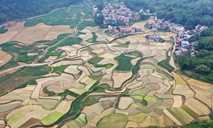Remote Himalayan border town rises to modernity
LHASA, May 9 (Xinhua) -- After throwing a thermos, some biscuits and a harmonica into his backpack, Tashi Tsering put on his green uniform, drank the milk tea his wife gave him, and headed to his pickup truck to start a day's work in the deep Himalayas.
Tashi Tsering, 45, is a patroller in Rongxar, a border town in Dingri County, southwest China's Tibet Autonomous Region.
The duties of Tashi Tsering and his teammates involve maintaining signposts and collecting garbage in the Qomolangma National Nature Reserve. Flocks of wild sheep often passed by while they were patrolling.
"In the past, wild animals would run away when they saw humans. Now, they come toward us unafraid," said Tashi Tsering.
Rongxar, meaning "deep valley" in Tibetan, is situated between two high mountains on the southern side of the Himalayas and near Cho Oyu, the world's sixth highest peak. For a long time, the remote town had been largely isolated from the rest of the world.
Dawa Norbu, from the county seat of Dingri, has been working in the forest management station in Rongxar since 2000. The 44-year-old remembers that villagers still wore army green canvas shoes and lived in stone houses -- throwbacks to a past era -- when he first arrived there.
"Back then, even many locals from Dingri had never heard of Rongxar before," Dawa Norbu recalled, adding that he spent two days trekking on horseback from the nearest town to Rongxar.
In April 2015, the town, home to some 1,000 residents, was jolted as a massive earthquake hit Nepal, with many houses toppled.
Following the earthquake, the government invests heavily into reconstruction. Over the years, steel-structured houses and concrete roads were built, and mobile signals and internet access were widely available.
"Now, young people are shopping online. People are wearing all kinds of leather shoes, sneakers and hiking boots," Dawa Norbu said, adding that express delivery vans come to the town regularly.
Better transportation also brings in more tourists, who come to see the secluded place with a breathtaking landscape.
Besides working as a patroller, Tashi Tsering also runs a milk tea house. Last year, he renovated the three guestrooms of his house and began offering a homestay for tourists.
"The tea house and homestay alone bring me more than 400,000 yuan (about 61,000 U.S. dollars) a year," said Tashi Tsering, adding that he also likes playing the harmonica and other instruments for his guests at the tea house when he returns from the patrol.
Eyeing the development prospective in her hometown, Trinley, a former barista in Lhasa, returned to Rongxar with her friend last year and opened a Tibetan restaurant together.
Drawing on their previous experience of working in a cafe, they decorated their restaurant with a disco ball and stylish posters. The dishes they serve, including Tibetan, Sichuan and Nepali styles, are also popular with both the locals and the tourists.
Currently, the restaurant generates monthly revenue of up to 10,000 yuan.
Last year, the per capita income of the township surged by 14 percent to over 15,800 yuan, thanks in large part to booming tourism.
Near Trinley's home, a commercial street is being built as part of the township's plan to develop tourism.
Trinley plans to move the restaurant to the commercial street after the street is built, and convert the restaurant into a cafe.
"There is not a single cafe yet in Rongxar. I believe our business will be much better," said the 27-year-old.
Photos
Related Stories
Copyright © 2022 People's Daily Online. All Rights Reserved.










